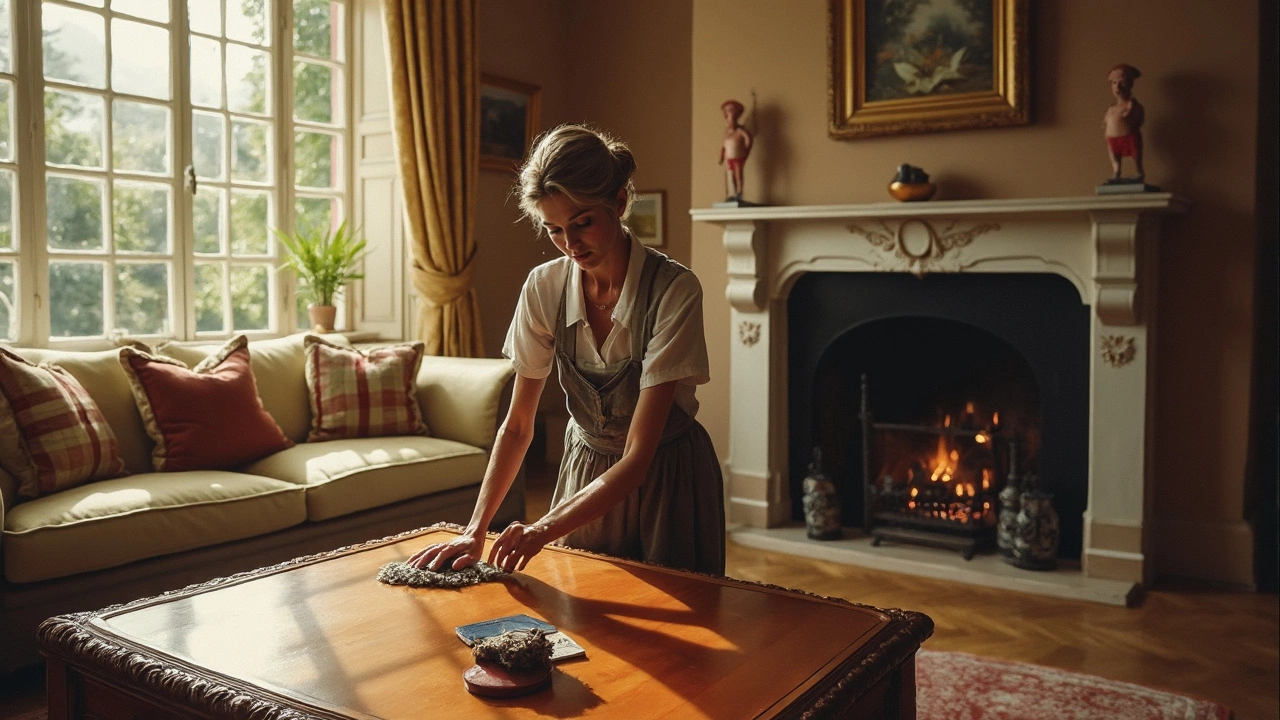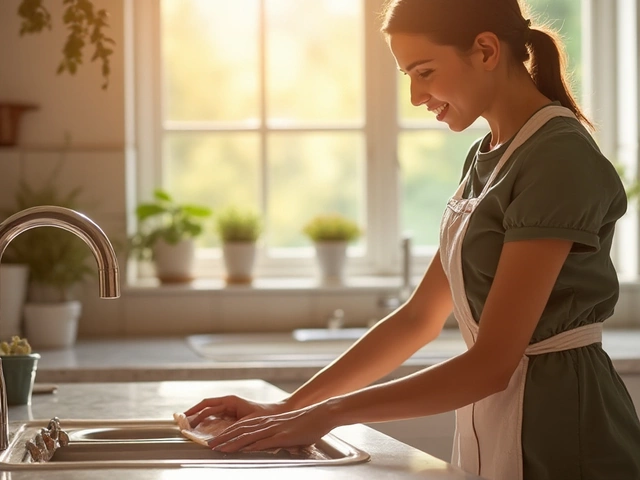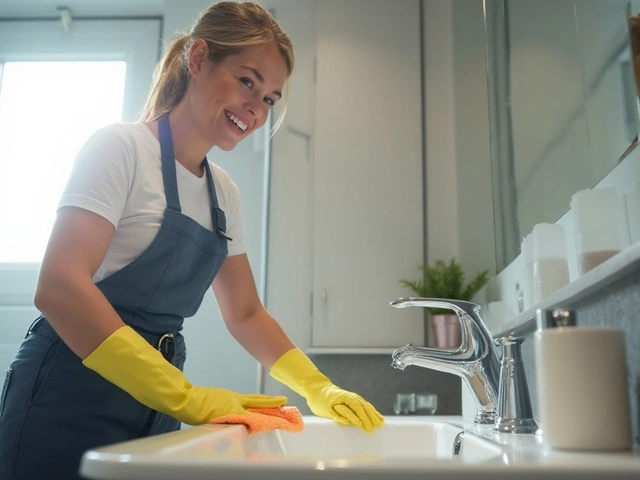Navigating the world of tipping can be as confusing as trying to fold a fitted sheet. When it comes to whether or not you should tip a cleaning lady who works for herself, it can be even trickier. This isn't just about washing dishes at a restaurant; you're dealing with someone who manages their own hustle—and that deserves some thought.
First off, let's talk about why tipping might be a good idea. Cleaning can be a tough gig, and those who are self-employed often face extra expenses like insurance, supplies, and transport that salaried workers might not think about. A tip can be a way to show appreciation for the extra effort put into making your space spotless, especially if the cleaner has gone above and beyond to tackle those stubborn dust bunnies under the sofa.
- The Basics of Tipping Etiquette
- Why Tip a Self-Employed Cleaner?
- How Much Should You Tip?
- When Tipping Might Not Be Necessary
- Alternatives to Tipping
The Basics of Tipping Etiquette
Tipping is one of those things everyone kind of agrees with but not everyone knows how to do right. When it comes to the world of cleaning services, especially those working independently, understanding the basics can help make sure you’re being fair and considerate.
First, remember that tipping isn’t a requirement but a gesture of appreciation. In the U.S., where tipping is more common, many people will offer a tip to self-employed cleaners as a way to recognize their hard work and dedication. It's like saying 'thank you' with a bit of extra sincerity.
If you're thinking about how much to tip, here's a quick rule of thumb: consider a range between 15% to 20% of the total fee. This isn't set in stone, of course. If the job was particularly intricate or demanding, you might want to lean towards the higher end, while smaller tasks might call for a more modest amount.
Keep in mind that even though your cleaner is self-employed, they still face many costs. Things like cleaning supplies, maintenance of equipment, and travel can all add up. A tip can help offset these expenses.
There's also the personal touch to think about. If you're using the same cleaner regularly and they've done an amazing job every time, it might be worth considering a seasonal bonus or a more substantial tip during holiday seasons.
Self-employed cleaners, like anyone providing a service, thrive on customer satisfaction. A tip can be a vital component of building a strong working relationship, ensuring your cleaner feels valued and might prompt even better service in future engagements.
Here's a quick table on tipping habits for self-employed cleaners from a recent survey:
| Situation | Average Tip |
|---|---|
| Standard Clean | 15% |
| Deep or End of Tenancy Clean | 20% |
| Extra Tasks (organizing, laundry) | Extra $5–$10+ |
In short, tipping isn't just about the money; it's about respecting the effort and skill that goes into making your home look amazing. And if you’re wondering, yes, your cleaner probably appreciates every bit of it.
Why Tip a Self-Employed Cleaner?
When you’re dealing with a self-employed cleaner, you're looking at someone wearing lots of hats. They’re not just cleaning your home; they’re managing a small business, juggling a ton of responsibilities. Think about it: they handle everything from booking appointments to buying supplies, and all those little behind-the-scenes things add up.
A tip can be more than just a nice gesture; it’s a way to recognize the blood, sweat, and elbow grease they pour into every job. It's not just about dusting and scrubbing; it's about providing a personal service that often goes above and beyond what's expected. So, when they achieve that just-moved-in sparkle that makes your place shine, a tip can show you noticed.
And let's not forget about the little extras that sometimes come with independent work. Unlike cleaners working for big companies, a self-employed cleaner doesn’t have a safety net of benefits like health insurance or vacation pay. A tip can help cover these kinds of costs, providing that little bit of extra support in their financial planning.
Though not obligatory, tips can also foster a better working relationship, especially if you plan on hiring them regularly. Regular tipping signals appreciation and encourages high-quality service. After all, who doesn't want to feel valued? It's a simple way to show respect for their hard work and dedication.
Still on the fence? Consider this: tipping could also mean prioritizing them next time you need help. If you’ve ever had an emergency cleaning need, you know how vital it is to be on top of their list.

How Much Should You Tip?
So, you're thinking about tipping your cleaning lady who runs her own show? Good on you! But how much should you actually give? Well, there isn’t a one-size-fits-all answer, but I’ve got some tips to help you figure it out.
Tipping in the cleaning services industry varies, but a general rule of thumb is to tip around 15-20% of the total bill. This range puts the tip in line with what you might tip in restaurants, which is based on a similar service-reward relationship.
According to Jane Doe, a service industry expert, "A thoughtful tip can strengthen your relationship with any service provider, showing them you value their hard work and dedication."
If your cleaner works on a more flexible schedule or does additional tasks like organizing or deep cleaning, you might consider tipping more. After all, recognizing when someone goes above and beyond is always appreciated.
Still unsure? Let's break it down further:
- If the job was small and straightforward, like a basic clean, a 10% tip will be just fine.
- For larger jobs, such as deep cleaning after a move-out, aim for at least 20%.
- If they provide additional services like carpet cleaning or window washing, consider upping the tip or offering extra compensation for those tasks.
No rigid rules here, but these guidelines can certainly help. And remember, it's always better to tip with appreciation than to not tip at all. The key here is showing gratitude for a job well done!
There's a bit of joy in knowing your tip likely made your cleaner's day brighter. It's not just about the cash—it's about showing respect for someone’s dedication and skill in keeping your space feeling brand new.
When Tipping Might Not Be Necessary
So, when might you skip the tip without feeling like a cheapskate? First thing to consider is if the self-employed cleaner includes a service charge or fee that's labeled as 'gratuity' or 'tip' directly in their pricing plan. Some self-employed cleaning professionals set their rates with all-inclusive fees, meaning they've already accounted for what others might consider a tip.
If the cleaning lady is contracted for an agreed set amount where both parties had a clear agreement, tipping might not be necessary either. Say you’ve negotiated a flat fee for a specific end of tenancy cleaning job. In such cases, a pre-negotiated, clear payment often means there’s no expectation for more cash at the end.
Another scenario where tipping isn't a must is during promotions or discounts. If you're benefiting from a reduced rate offered as part of a marketing effort, then a tip might not be necessary since the standard rate wasn’t applied.
Lastly, consider your previous arrangements. If you’ve struck up a regular deal with your cleaner, like an every-other-week service, and you’ve consistently paid the agreed-upon rate, you don't need to tip every single time. Some folks choose to tip around special occasions instead, like the holiday season, as a gesture of appreciation.
However, it’s always good to remember that showing gratitude doesn’t always mean cash. A genuine thank you, a small gift, or even recommending their services to friends can be equally valuable.

Alternatives to Tipping
So, maybe tipping isn't really your thing, or perhaps you're on a strict budget. No worries! There are plenty of other ways to show appreciation for a self-employed cleaner's hard work without reaching for your wallet.
One great option is to provide a positive review or referral. A good word online or a shout-out to friends and family can go a long way. Self-employed cleaners rely heavily on word-of-mouth to grow their business, and your glowing review could help bring them more clients. If your cleaner has a business page on platforms like Yelp or Google, leaving a five-star review with some kind words about their service can be invaluable.
If you have a long-standing relationship with your cleaning lady, consider offering small gifts. This can be as simple as a batch of homemade cookies or something practical like a good quality cleaning cloth. It's a thoughtful gesture that shows you're grateful for their service.
Another idea is to offer flexible scheduling. If you can be accommodating with appointment times, especially during busy periods or unexpected events, it's a simple yet appreciated way to make their job a bit easier.
Finally, remember that good old-fashioned appreciation goes a long way. A thank-you note, a verbal acknowledgement of a job well done, or just taking a moment to express gratitude can make a big difference. In a job where hard work often goes unnoticed, a little recognition can make someone’s day.





